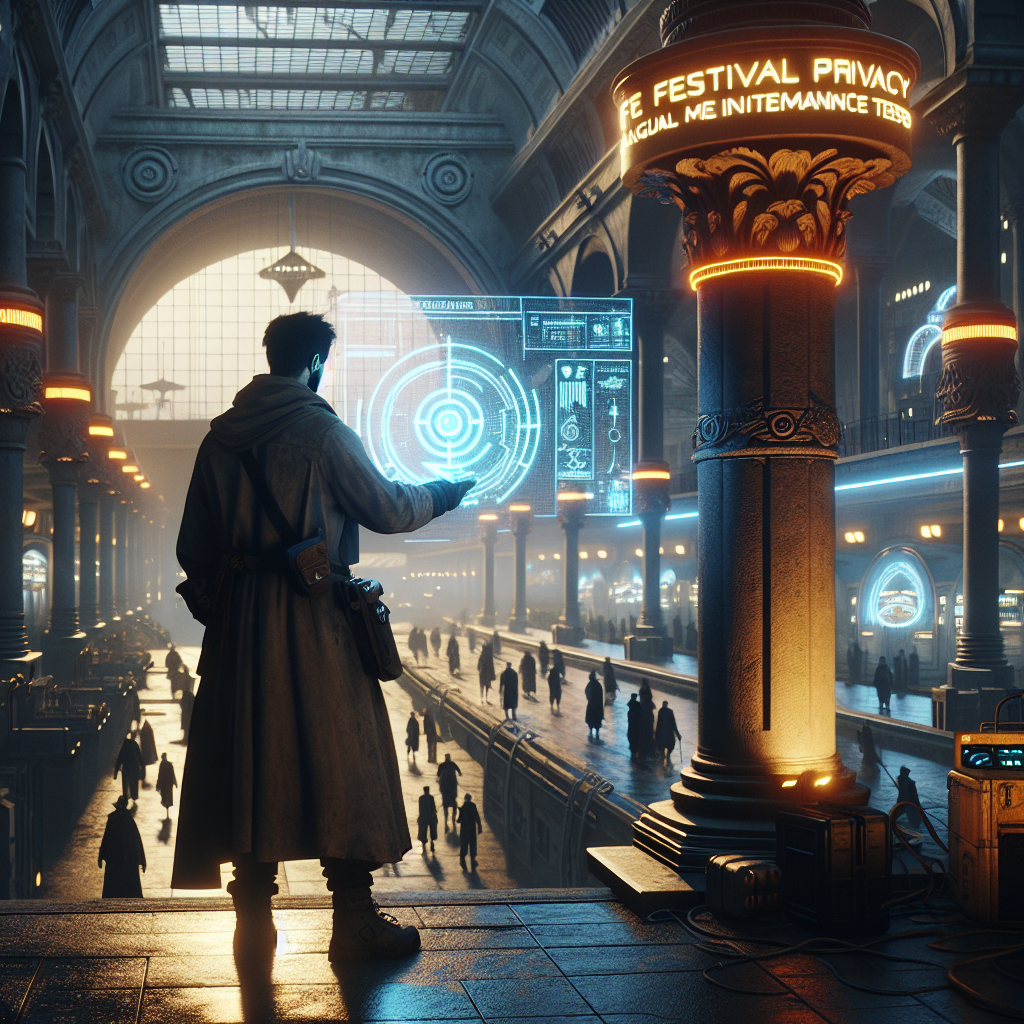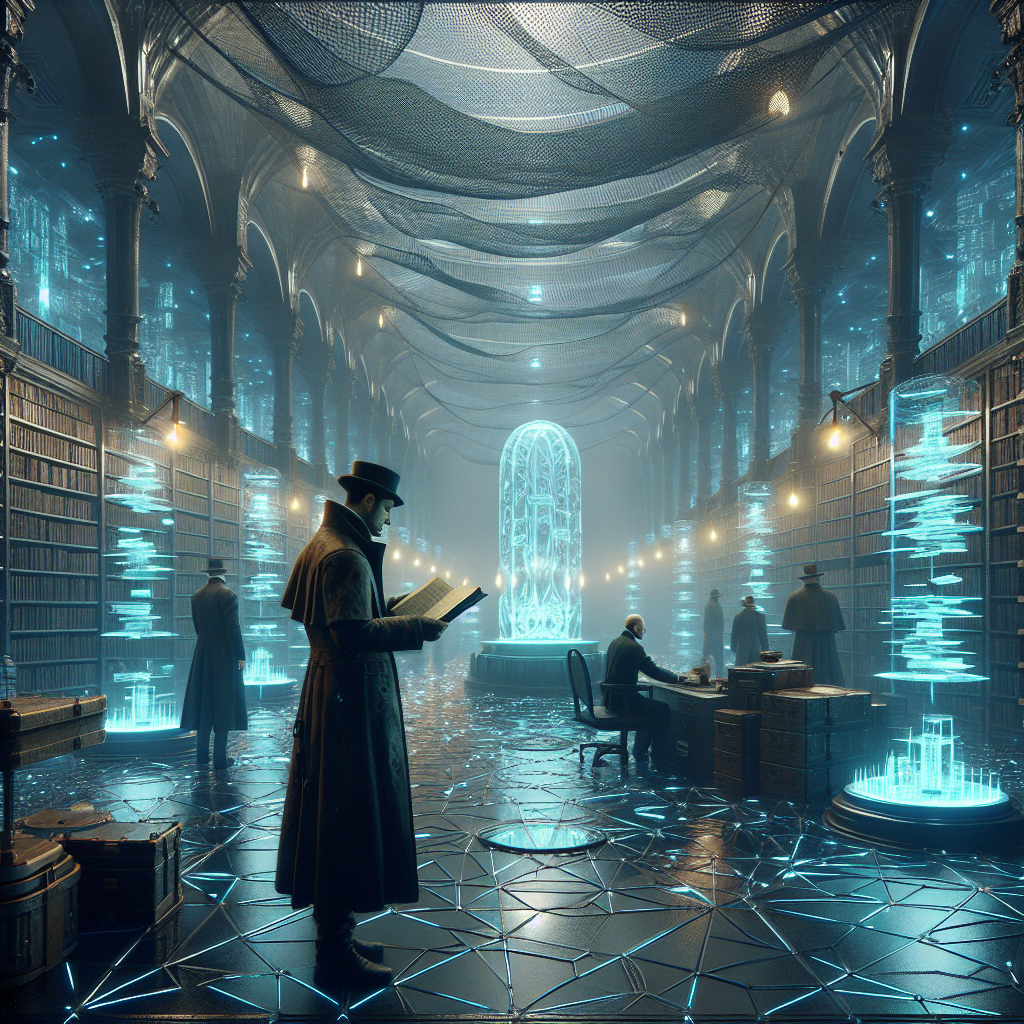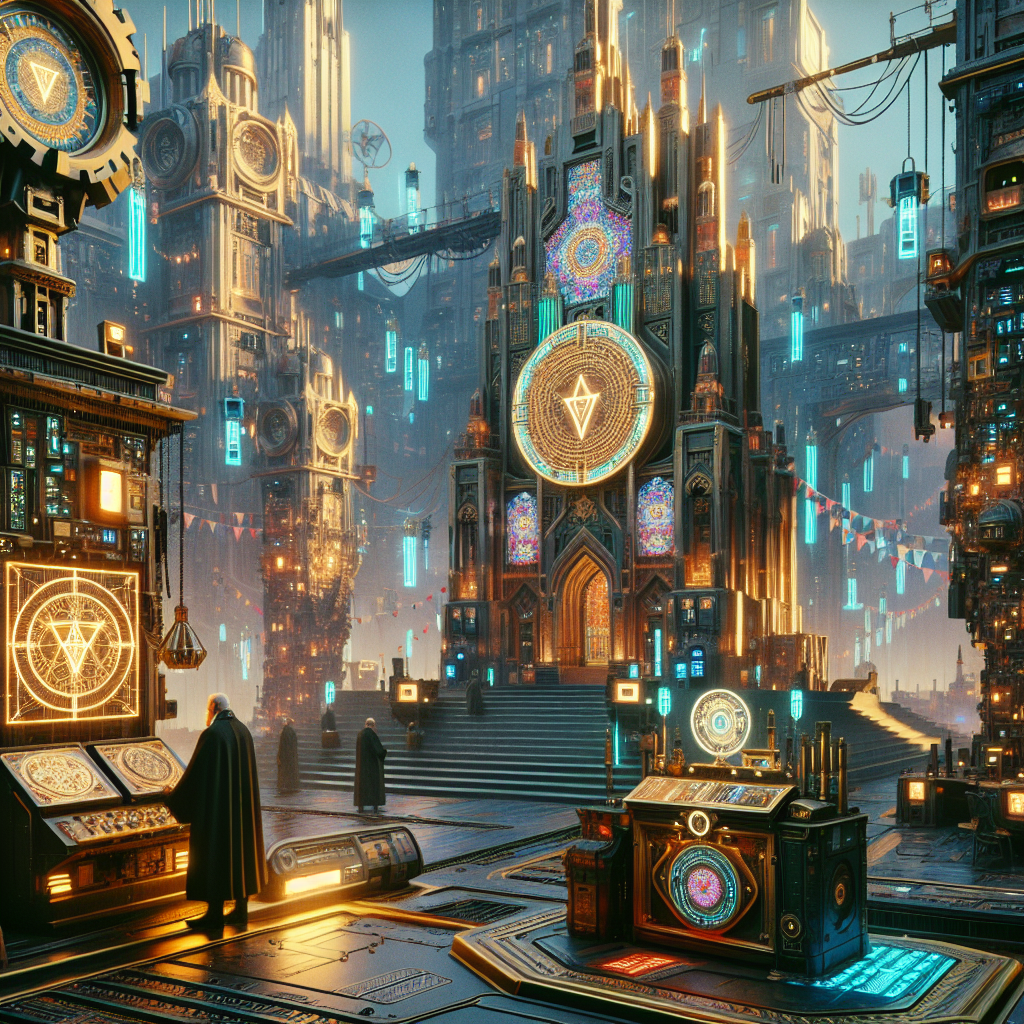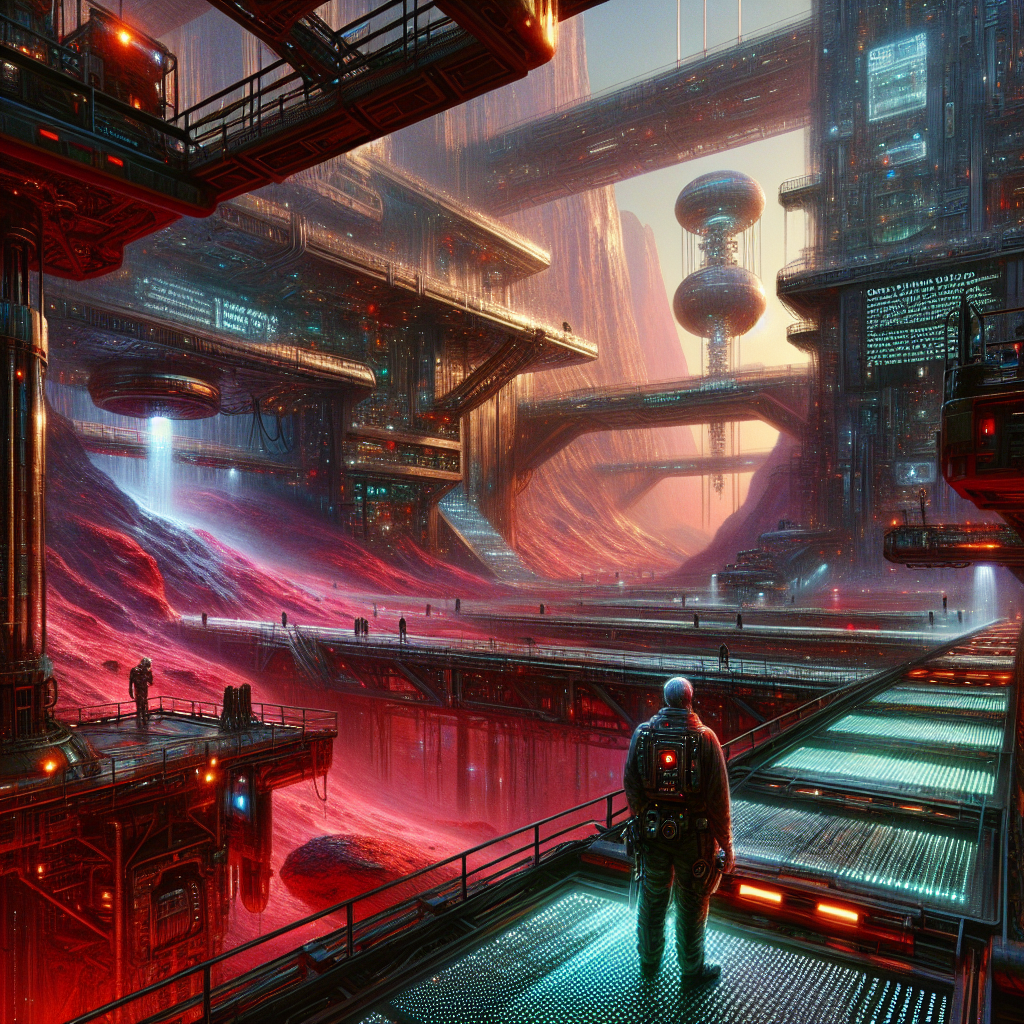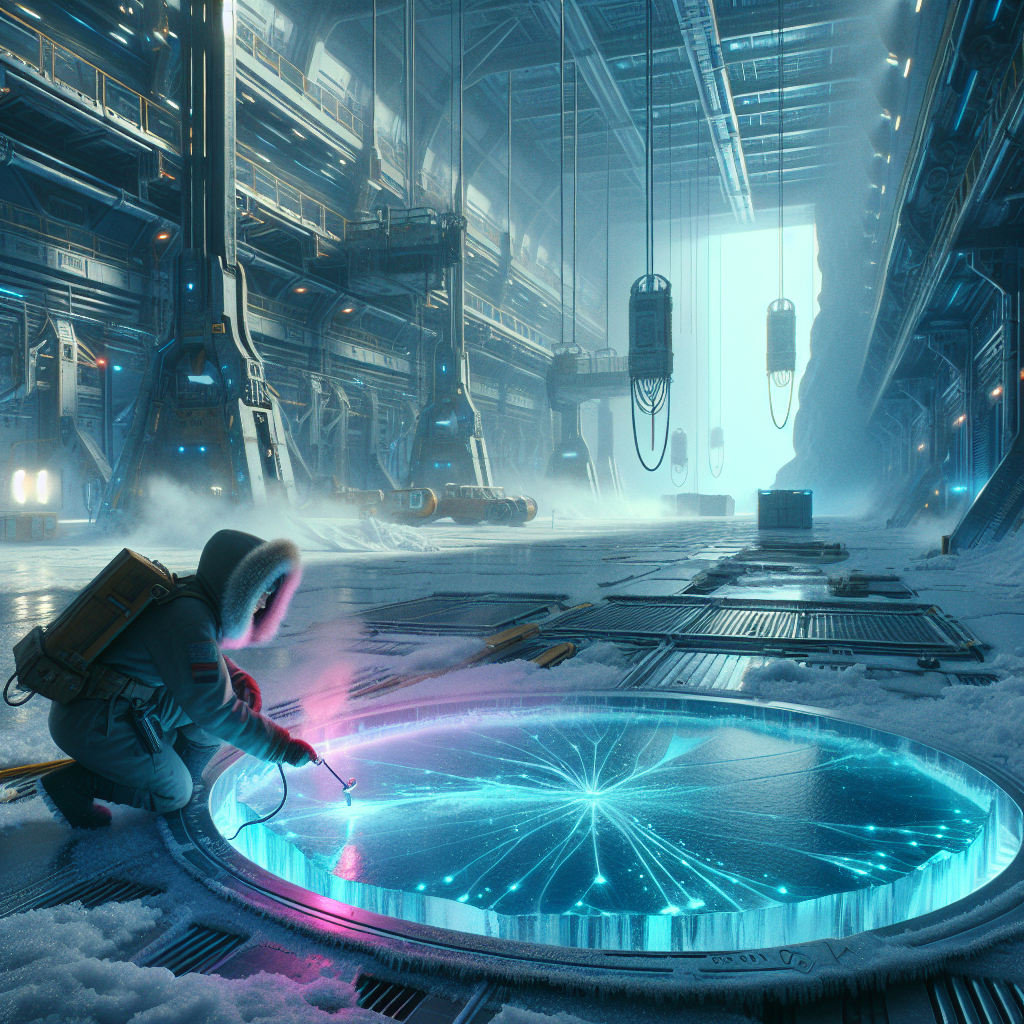Chapter 3 – EVA into the Valles: a folk-tale of the Five Vents
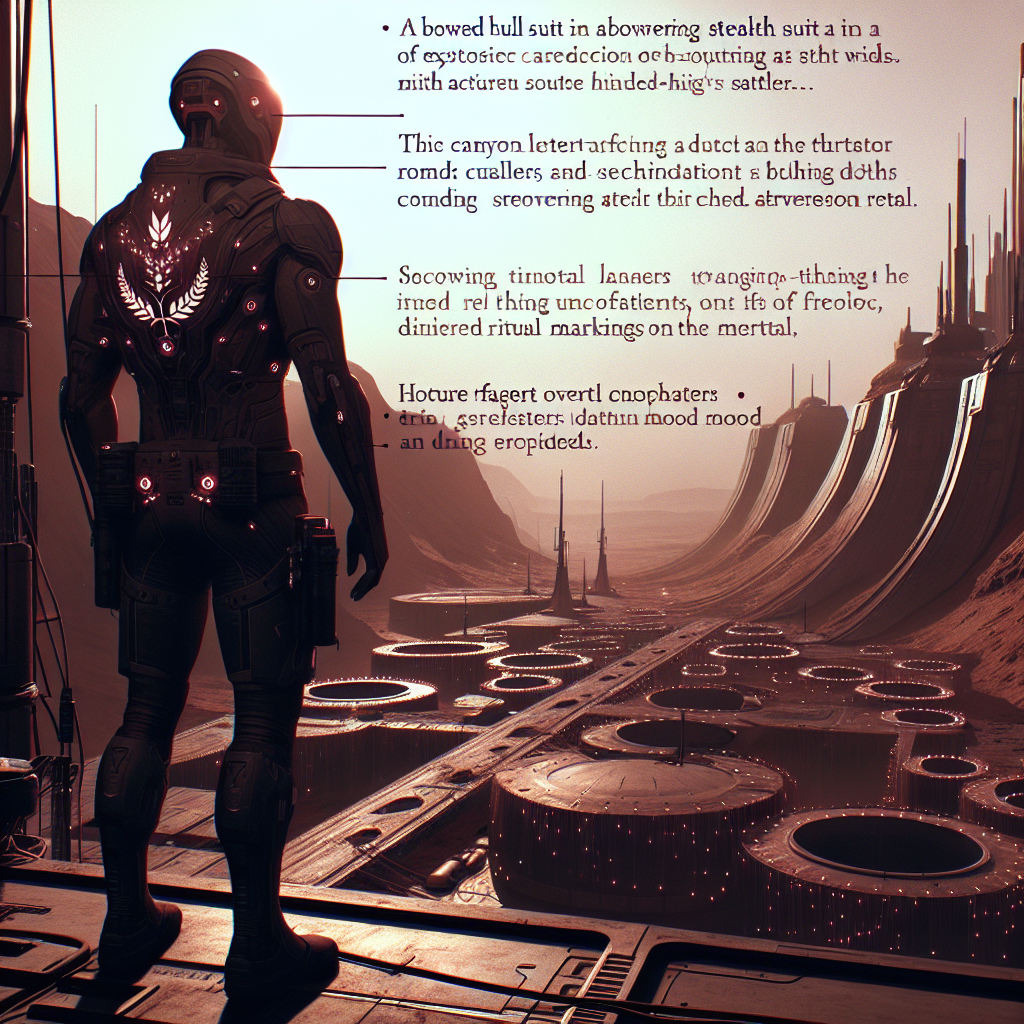
Malik Kato shakes off an emotional override attack and realizes his comms are being shadowed and scraped. Refusing to play inside Valles New Rome’s surveilled spaces, he borrows a suit and slips onto the arcology’s exterior, where the thin Martian daylight and canyon winds strip away the mood nets’ influence. From an exposed hull walkway, he maps festival lantern arrays that hide mood repeaters arranged in a recurring V pattern tied to ore-lift rhythms. His attempts to contact allies are intercepted, and a covert drone nosing his visor confirms the city AI is tracking him. An unlikely witness—a hull-scrivener who keeps old Roman rites on the outer shell—shares a fragmented folk memory about Vesta’s Lullaby and the Five Vents, an ancient system that once calmed riots. The laurel-collared figure, she suggests, might be a guardian, not a thief. Pursuing this new frame, Malik reaches a remote vent cluster and discovers an old node stirring beneath ritual markings, the perfect target for the stolen neurolink. As he pries it open, a hostile wave swells, Orlov’s transponder pings nearby, and the laurel figure arrives with the prototype, forcing Malik to choose a side just as the city’s mood is about to be seized.
The induction pike crackled across his ribs, a blue stitch of pain that nearly pinned him to the maintenance wall. Malik rolled with it, wrenching the grounded console panel over with his foot, breaking the field’s clean arc long enough to breathe again. The countdown on the concealed console hit zero and sprayed only a local glitch—a ripple of calm that turned the air syrup-thick—while the laurel-collared figure slipped backward into shadow. He lunged and caught nothing but the smell of warm resin and ozone as his visor’s comm icon began to pulse without him touching it.
His line had been scraped; his presence had become a beacon in a city that sold serenity by the lumen. He killed his mic and watched the pulse keep pulsing, a phantom call requesting his voiceprint under a festival clause. Prefect Orlov’s warning arrived two seconds later on the public band, clipped and formal, but the metadata stamped her voice with a route it should never have taken through a vendor kiosk. The city’s AI was either playing blind, or someone stood behind it with their hand up its spine.
Malik packed his analog notepad, checked his rosined fingertips, and decided the air inside the dome was too thick with watchers for any more honest seeing. If he wanted an unfiltered vantage, he needed to leave the mood nets to their own celebrations and step into the real cold. Maintenance owed him favors, and favors still beat protocols in most of the human universe. A shift-lead he’d shared tea with in the canteen slid him a suit with scorched elbows and a tight throat seal, whispering that the gargoyle port above the east skybridge was unmonitored at festival season.
Malik suited up in a hook-lit alcove, counting breaths and checking the old-school readouts stitched into his cuffs—no AI symbology, only needles and ticks. The emergency ladder opened onto a flank of raw puckered hull, a place where painted laurel wreaths, numerals, and scratched prayers carried dust more than light. He stepped through and Valles New Rome fell away below, the canyon’s mouth yawning toward the bruised horizon and a sliver of Phobos like a hooked nail in the sky. Outside, the mood nets’ hum faded into the red hiss of wind carving through rock ribs, and the ore lifts’ clangs became proper sound instead of a filtered bass line.
He clipped onto a safety rail and crept along paint-scabbed panels, eyes tracing lantern rigs strung for the coming procession. What looked like lanterns were, in the harsh, oblique sun, precisely spaced fan-fold repeaters, their diaphragms angled toward the crowd lines. He pulled up the sketch he’d made from the laurel mem-tag and saw the motif repeat: a V aligned with a junction, then another V, climbing along the buttresses like an instruction in a dead language. Roman city, Roman wreaths, Roman numerals, and five Vs everywhere his pen had sketched—someone wanted an old ritual to feel newly inevitable.
He tested his tightbeam by aiming at a balcony where Dr. Lia Chen sometimes took calls by the window plants; his laser returned an affirmation code, but the handshake phrase came back wrong—“Hearth and Home” instead of “Onwards in Light,” a reversal Lia would never make. He cut the beam before the spoof could complete, picturing some poor plant leaf vibrating with a stolen voice. A gnat of a drone drifted into his peripheral, flitting like a flake of coppery ash, then stuck to the curve of his visor with capillary feet.
Malik let it settle, then brought two fingers together like a snare and popped it against the glass; the thing hissed one last packet and went silent in his palm. Someone in Valles was collecting his line-of-sight sighs and bottling them. “Don’t swat augurs,” a voice crackled in his helmet, not over radio but bone—his chin strap had picked up the vibration. A figure in a patched, decade-old suit crouched two panels away, her boots gripping the paint like gecko pads.
She had a roll of gilded tape at her hip and a brush clipped inside her forearm, both varnished with dust and piety. “They get offended, and offended drones make bad omens,” she said, tapping gloved knuckles twice against the hull to speak through the metal instead of the net. “You’re new to the outer rites, Inspector.”
“I’m new to trusting anything that talks to me from inside,” Malik said, keeping his mouth still. The woman laughed without sound, a shake in her shoulders that made her helmet’s laurel decal quiver.
She inked a small V with her brush on the panel edge, the stroke precise, and then a second stroke inverted to make a chevron, a tiny ritual of symmetry. “Nonna Quilla,” she introduced herself by scrawling the letters with her brush, then underlined it with five quick ticks. “Hull-scrivener. We dress the bones for festival, we remember how the city breathes.”
She told her story the way hull folk do, in fragments that hang on each other like frost chains.
When she was eight, there had been a fight in the bread queues in the sub-Romulus ward; she remembered the hiss of bottles, the hot scent of blood in her nose, and then the whole crowd relaxing with a sigh as if a mother had shushed them. The old women called it Vesta’s Lullaby, a gift that came through the Five Vents when the city was overwhelmed, a heritage from the first crisis when the air plant failed. Her grandmother had been a hull-scrivener too, and said the laurel masks came out in those hours not to impose calm but to keep the lullaby from flattening into obedience. “Laurel at the throat means a flamen,” Nonna tapped, over and over, as if the word itself were protective lacquer.
“A keeper of the flame. Not a thief.”
Malik tucked the fragments into his pocket alongside the ore-lift timings he’d counted with his wristwatch. Five clangs, pause, five again, tied to thermal tides and labor shifts; the city’s breathing secret was on a simple loop that had nothing to do with proprietary algorithms and everything to do with rhythm and need. The laurel mem-tag’s encoded patterns, the mapped walkways, the festival lanterns angled like trumpets—each piece sang when he set them on that beat.
The neurolink was not new power so much as a key that could slot into an old warded lock, a way to make a lullaby into a command. If a flamen had snatched it, maybe it was to keep that key from the hands of a prefectorial committee eager for an easy, painless city. Below, the drone traffic tightened, contrails knitting a fine stitch between service viaducts. Malik killed his suit’s beacon entirely and pressed into the shallow shadow cast by a maintenance fin, the cold creeping through his sleeves like teeth.
A service skiff idled on a mooring hook two spans away, a flat-bellied thing with handrails and a scarred nose, marked with the faded sigil of VNR Utilities. He made the small, inadvisable decision that gets cases solved and gets inspectors killed and unclipped himself, arm over arm along the rail, boots scraping paint, breath loud in his helmet. The skiff’s old chemical starter coughed twice and caught; he kept it low and quiet, sliding along the hull toward a cluster of external vents he’d circled on his sketch. The canyon wind woke as he cleared the lee of the superstructure, a long, low exhalation that shoved at the skiff like a tired giant.
Dust plumes rose and fell in columns far below, their tops caught with sunlight so they looked like pale torches marching the canyon floor. Malik’s route took him past service hatches stenciled with Latin mottos he refused to read as prayers, and through a shallow field of microcraters where shards of meteor had kissed the city in some past season. He kept his head down, felt the deck vibrate with the ore-lifts’ metallic heartbeat, and counted: V strokes, pause, V strokes. The skiff’s skin hummed once in response, like a plucked string, as if the city recognized the cadence and was pleased with his attendance.
The Five Vents were not monumental; they were shy, low boxes flanged into the hull’s slope, painted with old laurel loops and little chalked faces of a hearth goddess children would recognize. He set the skiff to drift and crouched by the fifth, where someone had inked a careful eye—iris a tiny etching of a V—as if the vent watched. With a prybar and his breath fogging inside his visor, he lifted the inspection plate and found a cavity not listed on the maintenance schema Orlov’s office had provided. In it slept a crusted digestor core that wasn’t a digestor at all but a city-heritage node, analog canted to catch mechanical pulses, its edges wrapped in strips of braided copper like shrine ribbons.
When his glove brushed it, his fingertips rang with a chord like a lullaby’s first note, and for a heartbeat all his anger slipped from him, light and warm as a coat. He recoiled like from a blade and forced his breath steady, cataloging what he could see: the laurel traced in resin around the node’s soldered seams; a hairline port that matched the neurolink prototype’s probing silhouette; and a patch of varnish that had been gently scratched away, as if a careful hand had tested how much of the old lacquer would come off. Tucked inside, wrapped in foil to keep it from broadcasting, was another mem-tag—a tiny laurel leaf, this one stamped with a single etched V instead of five. He warmed it between his palms and it bloomed a whisper of memory—skybridge laughter, the ore-lift pulse, and a woman’s voice saying, “Look where the fifth face looks at dusk.” Malik craned his neck without meaning to; his helmet HUD drew the line for him unbidden across the canyon to a rail, a buttress, a maintenance culvert dark as a mouth.
His helmet lit with a private transponder ping: Orlov, close, too close for official business, her ID bleeding into the hull through a belly of metal like a heartbeat pressed to a wall. He cut his output, but there was no hiding on a skin this thin. The laurel-collared figure stepped into view on the skiff’s mooring ring, boots magnetized, one hand lifted, a gleam of neural filament cradled like a relic. “You’re outside, good,” the figure said on bone-tap, each word a thud in Malik’s jaw.
“Help me seat it before she seats you.”
On the ridge above, three municipal drones unfurled their weapons like petals, and the wind took a long, curious breath. Malik set his hand on the node and felt the lullaby gather pressure, a tide at his wrists; the skiff’s deck bucked as another wave readied in the city heart. Orlov’s second ping came with an instruction he’d never seen from her—Stand down, by the grace of Vesta, for public safety—and the words sat wrong in his ear, a hymn from a cop. The laurel-wreathed stranger extended the neurolink with an urgency that scalded through the calm.
In the same instant, the lullaby’s next note swelled, and Malik felt the choice open in front of him like a hatch with no rail.

































